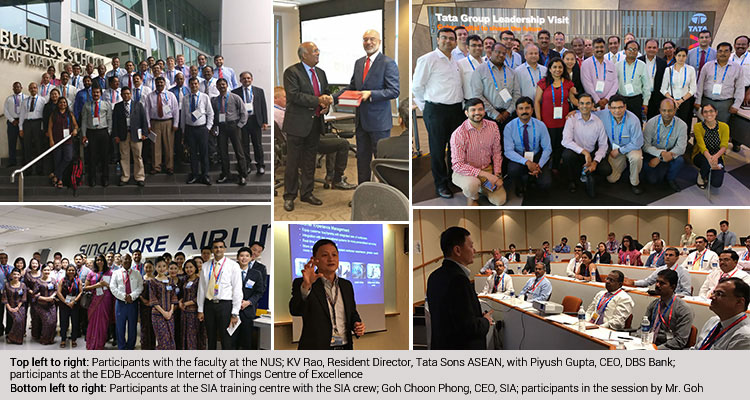Published on March 21, 2017
The Best Practices initiative in the Tata group focusses on learning not only from within the group, but also from companies that have operations all over the world. Putting this philosophy in action, Tata Business Excellence Group (TBExG), in association with the Tata Sons ASEAN office, organised the first ever external Learning Mission to world-class companies and educational institutions based in Singapore from March 13-16, 2017. The Tata Sons ASEAN office led the efforts in Singapore, conceiving and executing the programme. The organisations which shared some of their processes and best practices included Nanyang Technological University (NTU), Singapore Airlines, National University of Singapore (NUS), Sembcorp Industries, EDB-Accenture Internet of Things Centre of Excellence, DBS Bank and Singapore Management University (SMU). A total of 36 executives from various Tata companies took part in this Learning Mission.

The participants started the Learning Mission by visiting NTU, and interactive with faculty from the Asian Consumer Insights department, which is renowned for its research expertise and experiments. The professors and faculty at NTU told participants that they use neuroscience to identify the change in preferences and behaviours of consumers. Based on this research, companies get access to unique actionable insights so that their products and services are in line with consumer expectations. The session in the classroom was followed by an exciting visit to the University’s lab showcasing the equipment the researchers work on.
The next day was an exciting session with Singapore Airlines (SIA). Goh Choon Phong, CEO, SIA, threw light on the company’s strategy for the past six years, which had worked well for the company. However, he said that with the changing market scenario, the company had adopted a different strategy and was working towards its achievement. The new strategy was four pronged: Building a portfolio of airlines; operating on a multi-hub basis; find new sources of revenue and businesses; and strengthening the current network, products and services. Post this session, participants got the opportunity to tour the training centre of SIA, which is used for training the airline crews on service, and safety.
The National University of Singapore (NUS) was next, where Prof. Micheal Frese focussed on how cross cultural aspect affect businesses. The professor encouraged participants to provide examples of Tata companies to simulate discussions around building a culture of innovation, institutionalising the culture and managing change within the organisation.
Day 3 began with a visit to Sembcorp Industries, which is in the utilities, water and onsite logistics business. Executives from the company took the participants through the business model of their organisation and threw light on various processes it follows. Executives from Tata companies involved in the power and steel businesses asked pertinent questions ranging from the future of the renewables sector, the competitive scenario and the energy market segment in Singapore. The session was followed by an in-depth tour around the Sakra and Banyan plant facilities of the company.
The second half of the day was dedicated to EDB-Accenture Internet of Things Centre of Excellence. Mohammed Sirajuddeen, Managing Director - Accenture Digital, took a session on how innovations are enabled through a five pronged approach, namely research, ventures, labs, innovation centres and delivery centres. He stated that EDB-Accenture has created an ecosystem of universities, government agencies and private organisations to identify trends and help companies change their existing business models. The team working at the Centre of Excellence then took the participants through live examples of companies that they have worked with.
The last day of the Learning Mission was spent on the financial and marketing aspects of businesses. Piyush Gupta, CEO, DBS Bank, took the participants through the bank’s journey of transforming into a world-class MNC bank. Highlighting that the bank’s transformation was planned in 3 phases, he explained that the three years till 2012 were spent on changing the way the organisation functioned and creating an asset light business. The current strategy of the bank involved embracing digital, rethinking the customer’s journey and creating a startup culture. Sandeep Lal, Head of Consumer Banking then took a session on the digital revolution of the bank, throwing light on how they have embraced the digital to make the customer experience great. Neil Cross, CIO, DBS Bank, then presented how innovations are used to foster a disruptive culture within the organisation. The visit to the bank ended with a visit to the innovative Joyspaces – DBS office spaces which are designed to foster collaboration.
The last session of the Learning Mission focussed on the marketing and business innovation trends, which was conducted by faculty in Singapore Management University (SMU). Dr. Kapil Tuli, Associate Professor of Marketing, SMU, took to the stage to highlight the key trends of the retail industry in Asia, sharing how the online retailing industry is currently at $29 billion, with a potential for growing 10 times its current size. Prof. Srinivas Reddy, Director, Centre for Marketing Excellence, SMU, explained how the marketing strategies of companies have changed with the advent of social media. Lastly, Neeta Lachmandas, Director – Institute of Service Excellence, SMU, made a presentation on the key trends in the services industry in Singapore.
The format of the Learning Mission was an interesting one, with experiences and visits interspersed with corporate presentations. All in all, the Learning Mission gave lessons which were practical as well as fascinating!


